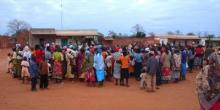Nairobi Forum: customary justice applies norms as practiced by people
African high-level jurists, experts and legal scholars are meeting in Nairobi for the East Africa Regional Forum on Alternative Dispute Resolution &


Since August 2010, Kenya has been implementing a new Constitution with an expanded Bill of Rights and ambitious government decentralization (devolution) processes. The transferring of a large number of national functions to 47 newly created county governments has strengthened accountability and public service delivery at local levels. Building on notable progress achieved over a relatively short period, efforts continue to align pre-existing laws with the Constitution and to enact new laws to implement its provisions. Particular focus is being placed on legal interventions that will address issues of transparency, gender equality, peace and security, and the climate crisis.
Kenya is a Member Party of IDLO, and since 2010 the organization has collaborated with the institutions responsible for implementing the key provisions of Kenya’s Constitution, particularly relating to the Bill of Rights, land and the environment, devolution, the judiciary, access to justice and representation of the people. A key component of IDLO’s work is advancing gender justice in the country’s courts and institutions, and operationalizing the gender provisions contained in the Constitution.
IDLO also works closely with the Judiciary of Kenya, including on commercial justice reforms, such as the implementation of e-justice solutions and the establishment of Small Claims Courts, which help to streamline and speed up court processes and expand access to justice. IDLO is also providing technical support to the Sexual and Gender-Based Violence (SGBV) Court, and has helped develop policy and legal frameworks on managing and responding to SGBV.
![]() An overview of IDLO's work in Kenya
An overview of IDLO's work in Kenya
African high-level jurists, experts and legal scholars are meeting in Nairobi for the East Africa Regional Forum on Alternative Dispute Resolution &

East Africa Regional Forum - Alternative Dispute Resolution & Customary and Informal Justice: Advancing SDG16 and Pathways to Justice

Ongoing automation processes are transforming Kenya’s judiciary into a fully-fledged e-court.

“Women’s participation is not simply ‘the right thing to do’. It can also lead to better justice outcomes and experiences,” stated IDLO’s Director of Programs Erwin van der Borght at the opening of the Regional Symposium of African Women Judges held in Fes, Morocco on October 10, 2019.

As countries seek to make progress towards achieving Sustainable Development Goal 16, there is growing recognition that it is essential to work with both state and non-state justice systems to strengthen the rule of law and effectively prevent and resolve conflicts.

Legal regulation is an essential tool for governments to promote healthy diets and physical activity to curb non-communicable diseases, IDLO told participants of a conference organized by the Association of Schools of Public Health in Africa (ASPHA) in conjunction with Makerere University’s School of Public Health.

Over 30 paralegals from Kenya, South Sudan, Somalia and Uganda as well as various community justice experts convened to advocate for the critical role and contribution that paralegal support networks play in raising legal awareness and supporting access to justice for all, at a regional forum held in Nairobi on July 22-25, 2019.
Justice within the context of commercial law is premised on the fact that an effective commercial justice system meets and facilitates the specialized needs of the business community and the private sector at large. However, there are persistent challenges related to the dispensation of commercial justice in Kenya.
Meru County in Kenya became the first to adopt a county-level policy on sexual and gender-based violence (SGBV). Approved in April 2019 and launched on June 26, 2019, the Meru County Policy on SGBV aims to close the gap between provisions in national legislation and the lived experience of SGBV survivors.

Non-communicable diseases (NCDs) kill 15 million people between the ages of 30 and 69, and over 86 per cent of these "premature" deaths occur in low- and middle-income countries.The economic impact, including loss of income by people harmed by NCDs, the costs of treatment, and the impacts on families threaten international development. Through regulation and fiscal reforms, countries can promote healthy diets, physical activity, and other initiatives reducing the prevalence and harms of NCDs.


